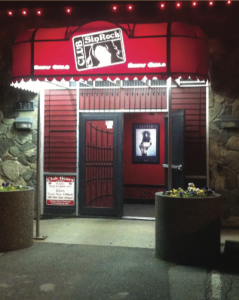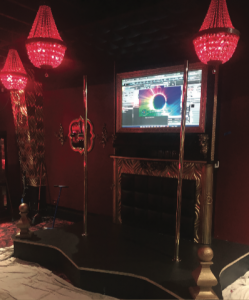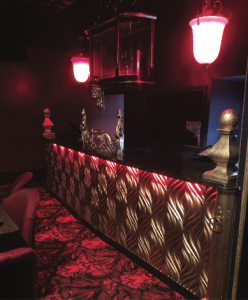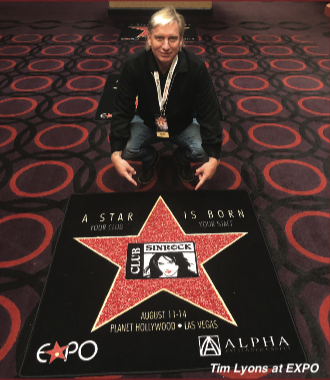(Note: This story appears in the November 2021 issue of ED Magazine)
*Story by Larry Kaplan
As a self-described workaholic, CLUB SINROCK owner Tim Lyons leaves no stone unturned when it comes to overseeing his clubs.
In the January 2018 copy of this magazine, the cover story focused on the CLUB SINROCK chain. Owner Tim Lyons explained then that the CLUB SINROCK name represents empowered women and comes from the history of the Alaskan gold rush and Mary Makrikoff — dubbed “SINROCK Mary” — a savvy businesswoman in an era of businessmen, who rose to prominence and became one of the richest women in Alaska at that time due to her work in the reindeer industry.
ED Magazine’s Larry Kaplan spoke with Lyons about how CLUB SINROCK clubs stand out from their peers due to the incredible attention he devotes to finer detail.
ED: Your clubs are anything but run-of-the-mill. Talk about what customers can expect as the common denominator of a CLUB SINROCK club?
LYONS: It comes down to different layers, starting with the first experience, with the doorperson to your hostess or bartender to your seat.
We look at the comfort of your seating, the lighting, the music, what’s on the walls. I was a professional poker player. I spent weeks in casinos and hotels in the poker tournament circuit. Ironically, people visiting our clubs routinely reference that it feels like a Vegas club. I’ve never tried for that, but it comes out in these finer details. As we know, Vegas is the standard for detail.
There are numerous things: we have customized matches and personalized toothpicks on our steaks. I make sure we have clean bathrooms. And then, of course, it comes down to the experience with the entertainers. That’s a whole new layer of an experience.
We cultivate that lineup to ensure a positive experience; patrons feel like they have control over their pocketbook; they can make their own decisions without feeling pressured. Although we like to influence people, our goal is keeping them in their chair, enjoying themselves for as long as possible.
I’m an artist. I come from a family of artists. A lot of my artistic background comes out in my club decor. We’re able to create things, including lovely interiors, because of my construction background. Before the collapse of real estate, I just had a small investment in our first club. I went all-in at that point.
ED: It sounds like you get satisfaction from building these clubs?
 LYONS: I enjoy creating an experience not only for the customers but the entertainers and employees. I don’t follow fads, trends, or other clubs; instead, I’m trying to create unique experiences. None of our clubs are alike, but they each have that CLUB SINROCK vibe — kind of a sultry, timeless Victorian goth-feel branding that everybody immediately notices. I remember those vampire movies we watched as kids, the sexual energy you felt as they’re walking through their castles and dwellings.
LYONS: I enjoy creating an experience not only for the customers but the entertainers and employees. I don’t follow fads, trends, or other clubs; instead, I’m trying to create unique experiences. None of our clubs are alike, but they each have that CLUB SINROCK vibe — kind of a sultry, timeless Victorian goth-feel branding that everybody immediately notices. I remember those vampire movies we watched as kids, the sexual energy you felt as they’re walking through their castles and dwellings.
ED: What’s new with CLUB SINROCK since that 2018 cover story? Have you opened any new clubs?
LYONS: We had a pretty big project going. We’d been looking for a little more upscale location. We found a downtown Portland location in 2018. We spent 18 months renovating the property. We opened for just four months before getting shut down for COVID-19 and never reopened due to a horrible experience with the landlord. We ultimately had to strip out and abandon that location.
ED: It must be hard, with all the effort you put into it.
LYONS: It was heartbreaking for the staff and me. That location was going to be our crown jewel. We put a lot into it. It was large, very upscale, highly innovative, and really exciting. It was a setback, but we’re fine. That’s another example of why we usually own properties before we go in and renovate them. I’ve seen so many experiences where other owners have lost locations for not owning the property. We’d leased it long-term because of that area’s real estate market. We wouldn’t have lost it if we’d owned it. We own
all of our other properties. We’re looking at other locations and strengthening the current locations we have right now because of COVID.
ED: How did you choose your four markets (Portland, greater Seattle, Anchorage, and Fairbanks)? Portland certainly had no shortage of adult clubs when you entered that market.
LYONS: I started in Anchorage because I lived there when I invested in that first club. When I decided to get serious about it, I started looking at overlapping markets, which I like. While there are significant differences between Seattle and Anchorage, they’re still overlapping markets; entertainers, staff, and customers fly back and forth regularly. Also, we choose areas that meet a three-hour rule. I like being within three hours of any location, by car or plane. We decided to stick to the Northwest. It made sense since we specialized in juice bars, which were pretty common in the Northwest.
We didn’t just jump into Portland. I lived around there for three years before opening that club. I wasn’t convinced it was going to work there. Lots of bars there have stages, but there aren’t many gentlemen’s clubs.
ED: There’s a lot of difference between strip clubs and gentlemen’s clubs …
LYONS: Yeah. We weren’t sure people wanted it. But I saw some places there that were gentlemen’s clubs. That convinced me. We got a location and did what we did.
ED: What are some things you’ve encountered since working in this industry that have surprised you?
LYONS: I was surprised that people in this industry are just regular folks, family people. And I wasn’t expecting as much of the prejudice I’ve experienced with so many related businesses. It’s just odd when you’re a taxpayer, doing everything legally. But yet, you’re looked upon differently; you’re sort of taboo and can’t get equal representation from other areas of commerce.
We’ve ordered carpet, scheduled it for installation, then the carpet company calls to says they found out we’re a strip club; they can sell us carpet, but they can’t install it. It took some time to adjust to, but we’ve grown a thick skin. You realize who wants to do business and who doesn’t.
When I entered this business, I decided to run it as a business — it wouldn’t be a lifestyle or playground for me. It was absolutely a business, very structured and well thought out. I think that’s why we’re still around and haven’t run across a lot of the pitfalls and liabilities that come to people that don’t operate as proper businesses.
And when you’re hiring managers and staff, it’s hard to find people that don’t get mesmerized and caught up in the experience, especially males, because it’s easy to do.
ED: What other common denominators are there in your four markets?
LYONS: We now have one liquor club in Portland, but I like non-alcohol. The liabilities are so much less. The customers are pretty comparable, as far as what they know, what they want, and how they expect to be treated. And the dancers are pretty comparable. With this industry, when you stay close to different overlapping markets, like the Northwest, you don’t get into situations where business models are so much different around you. And a common denominator is what customers want. It’s the same kind of customers in our four markets.
We’re all trying to figure out these millennials; I think we’re making progress. This industry has had to wake up to the fact that the baby boomers were drying up. It’s a different market — we have to earn it. People have to justify their spending, and that they’re getting good value and treated well. It’s just not like it was 15-20 years ago.
“We look at the comfort of your seating, the lighting, the music, what’s on the walls. I was a professional poker player. I spent weeks in casinos and hotels in the poker tournament circuit. Ironically, people visiting our clubs routinely reference that it feels like a Vegas club. I’ve never tried for that, but it comes out in these finer details. As we know, Vegas is the standard for detail.” — Tim Lyons
ED: I think at least until the mid ‘90s, if you had cold beer and tits, it was tough not to make a lot of money.
LYONS: It was a no-brainer. And guests liked to be treated differently. The customer today is a little different. They’re more sophisticated, surrounded by more technology. We’re trying to add technology, so it’s more visual for people. Because that’s what they’re used to now. They’re used to having their phones. We had strict phone rules; we can’t do that anymore.
ED: Not if you want to have customers or even dancers. They’re both so much different today.
 LYONS: They are, and we just have to be a lot more patient. They’re more sophisticated in many ways. They’ve been raised in a social media world. There are numerous ways dancers can make money on their phone without leaving home. We’re constantly dealing with that. I try to make the club more of a comfortable experience for them, so they know they’re kind of part of a family, have nice accommodations, feel safe, and have some mentorship. I’m making sure they have water coolers, refrigerators, all of these comforts you’d never see in a locker room 10 years ago.
LYONS: They are, and we just have to be a lot more patient. They’re more sophisticated in many ways. They’ve been raised in a social media world. There are numerous ways dancers can make money on their phone without leaving home. We’re constantly dealing with that. I try to make the club more of a comfortable experience for them, so they know they’re kind of part of a family, have nice accommodations, feel safe, and have some mentorship. I’m making sure they have water coolers, refrigerators, all of these comforts you’d never see in a locker room 10 years ago.
ED: So just as you’re attending to customers from the moment they walk in, you’re putting the same attention to every little detail for the entertainers.
LYONS: We remodeled the dressing rooms and added air conditioning, fans, and a shower in one of our Alaska clubs just for just that reason. They’re clean, comfortable spaces. It adds up.
My thought process on employees over the years has always been the same. I always want to ensure that I provide the best tools and best situation possible for them to do the very best at their job. All of my staff know that if we need something that will make us the best at what we do, we’re going to get it.
Everyone recognizes my partner, Rebeckah Lyons, as an essential part of the team and critical to the success we’ve achieved. I couldn’t do this without her. Rebeckah manages our back-of-house business, accounting, audits, human resources, etc. There’s a lot of necessary housekeeping that has to happen for our companies to be successful.
ED: Which of your markets is the most competitive?
LYONS: You’d think Portland, but we do well there because we stand out; we do a good job. Seattle’s probably the most competitive, maybe due to fewer clubs there. But Déjà Vu, who I’m very friendly with and respect a lot, has more clubs and stronger marketing because of that. They have seven- eight locations in that area; we have one. Marketing’s pretty essential when it comes to dancers and customers. Seattle’s the most challenging because it’s also the most regulated. We have to get much more involved in dancer licensing. We have to report hours and more. TJ, our Renton manager, is tied up with that often.
ED: Unlike some other club chain operators, you’re the GM of all four clubs, and you don’t have middle management between you and your four assistant GMs. Do you see that changing if you acquire more clubs?
LYONS: Yes, before COVID, I planned to have someone working with me as basically a comptroller to travel around and ensure that all paperwork is in order. We have to have all the proper contracts and all the correct licensing. Anytime that lapses, it’s a liability.
At this point, I can handle more than what I have. I’m hands-on. I don’t micromanage my managers, but I micromanage all the branding and marketing because that’s the most crucial thing about expanding and ensuring brand consistency.
We have a straightforward, strong but structured, easy-to- follow business model as far as the operations. Everybody reports to me daily. Thank God for texting which made it so much easier. I like being involved; our team as a whole must recognize there’s leadership that’s current and accessible at all hours if need be.
“My thought process on employees over the years has always been the same. I always want to ensure that I provide the best tools and best situation possible for them to do the
very best at their job. All of my staff know that if we need something that will make us the best at what we do, we’re going to get it.” — Tim Lyons
ED: Are there any specific challenges for you of operating multiple clubs at the same time?
LYONS: The challenges are if you have problems at multiple clubs that happen to pile up. COVID magnified all that, but I’m pretty good at sorting things out as they come up. I guess it helps that I’m a workaholic.
My only vices are coffee and work. I really love the creativity and the commerce of what I do. I’m an entrepreneur; I’m always excited about opportunities, and I do love the industry. I have a lot of respect for these women and people in the industry. It’s been rough with COVID, but I won’t let it make me bitter. We’ll just move on.
ED: What are the advantages of operating multiple clubs? For instance, does that allow you to move specific staff or entertainers from one club to another if necessary?
 LYONS: It creates more resources. We have a little more freedom with the obvious cash flow and more resources. It just creates an energy and positive impact on the company in general. Most of our staff are willing to help out wherever needed; they like the diversity. TJ and Jessica have been to other locations.
LYONS: It creates more resources. We have a little more freedom with the obvious cash flow and more resources. It just creates an energy and positive impact on the company in general. Most of our staff are willing to help out wherever needed; they like the diversity. TJ and Jessica have been to other locations.
ED: That’s great to have that commitment from your people. That respect is something that you command. It’s more than luck; you’ve earned that.
LYONS: It is about earning it. I do try to earn it. There’s no sense of entitlement when it comes to finding good team members, managers, dancers. You have to earn it all the way around, with customers, too — it’s one of the first things I tell my managers. Just because we’re going into a busy market, it won’t fall into our lap. We must earn those customers from other nearby businesses; that’s how it is.
ED: What other key issues do you address in your clubs?
LYONS: Recruitment and treatment of dancers are critical. They’re the bloodline. Our entertainers are drying up, and it’s not a good experience. So we’re constantly working on cultivating that. That’s why I spend so much time making their accommodations comfortable.
Larry Kaplan has for 20 years been the Legal Correspondent for ED Publications. In addition, Mr. Kaplan is a business broker in the sale and purchase of adult nightclubs and adult retail stores and the Executive Director of the ACE of Michigan adult nightclub state trade association. Contact Larry Kaplan at 313- 815-3311 or email larry@kaplanclubsales.com.
































